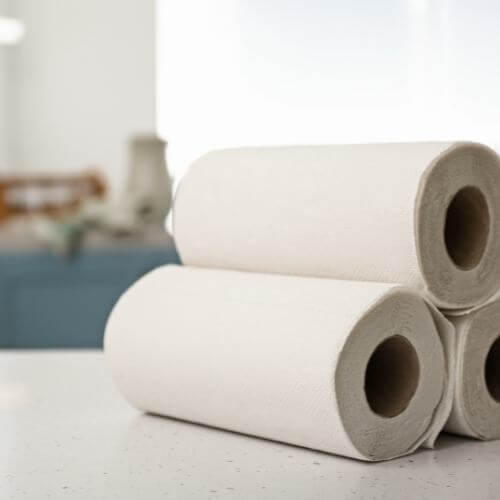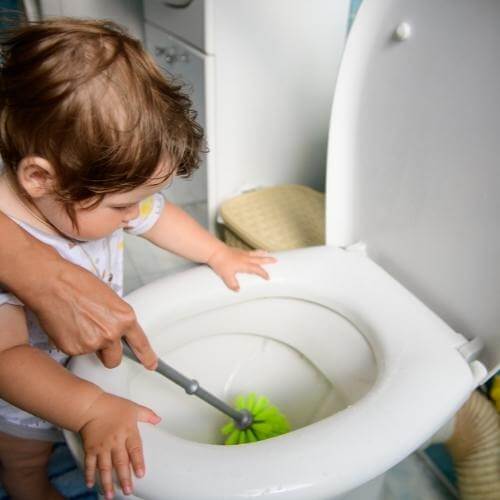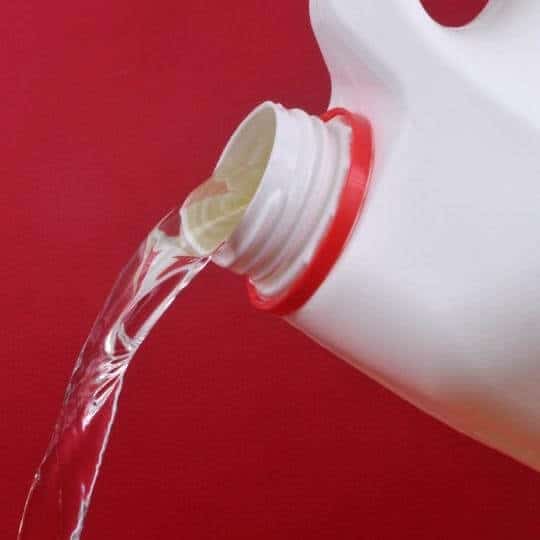The overall health of our plumbing and endurance of the pipe systems we have installed can be greatly altered depending on our behavior towards them. Pouring or flushing materials that shouldn’t be in our pipes, especially not through these methods, is one of the impactful factors that we have to take into account. That’s why today we’ll answer can you flush kitchen roll and some other items down your toilet.
Can you flush kitchen roll?

The short and clear answer is no. While kitchen roll may look similar to toilet paper, it doesn’t have the same properties. The differences between the two don’t stop with dimensions, the two items are made with different uses and materials in mind.
The kitchen roll has quite a hard time dissolving in our pipes. It is made to endure materials and liquids in order to soak them up as well as clean them better so the kitchen roll’s entire composition is a lot more resistant to dissolving effects. [1]
On the other hand, toilet paper is specifically made to be as easy as possible to flush and dissolve. You will note that wet toilet paper immediately softens and tears even with slight water exposure while kitchen roll can endure a lot more.
The situation is no different in our pipes. Even without the direct threat of rolling itself plugging our pipes, there are other side effects to consider.
Issues of flushing kitchen roll

As with every other material you shouldn’t flush, there are certain issues that follow if you do end up throwing them into your toilet. Which is why you should be careful with what you flush, even if it seems common enough to flush it.
Can you flush kitchen roll?
To repeat it once more, you cannot flush the kitchen roll. Doing so will lead to the following problems so you should avoid flushing it whenever possible.
However, it’s understandable to make a mistake or notice issues showing up that may be tied to this practice. In these situations, it’s good to know what to expect.
Fat and grease creating clogs
The main issue would be the accumulation of fat and grease on the kitchen roll we flushed. Fat and grease then result in major blockages which can be very troublesome to deal with.[2]
These two factors are frequently highly damaging to our pipes and can cause clogs wherever they show up. Their effect only gets worse when coupled with kitchen roll.
The kitchen roll can allow them to stick around for longer, thus maintaining a longer blockage within our pipes.
Anything on the kitchen roll can cause problems
If you have used the kitchen roll to clean out any part of your kitchen or other surfaces and then decided to flush it down instead of putting it in the trash, there could be heavy consequences for doing so.
Depending on the materials found on the kitchen roll at the time of flushing, it could cause different effects. If the materials on it, such as some cleaning solutions, are corrosive the pipes themselves could get corroded.
That problem is accented by the tendency of kitchen rolls to stick around making them persistent and consistent in their presence within the pipes.
Run out of toilet paper
The most common situation where we see kitchen rolls used and flushed is as a substitute for toilet paper. Sometimes we simply run out and the first alternative we think of is kitchen roll. Suffice to say, you shouldn’t be using it. However, let’s look into some useful items that could replace it.
Baby wipes
If you have a baby at home, it’s very possible you have baby wipes on hand. These can come in handy as a substitute for toilet paper if the need arises. The texture is also a lot smoother and with the added hygienic products that compose them, baby wipes are a great substitute.
However, they have a big downside. You should avoid flushing them. This is something to keep in mind if these wipes are used for your baby too. Throw the used wipes into the trash instead of flushing them down. One or two may not hurt your pipes as much but if you need to use more or have multiple people using them you’ll quickly run into problems.
Flushable wipes
It’s likely that the first item you will have on hand is flushable wipes. They can easily fit into your pocket and they often find themselves all around our household so getting a pack is usually a matter of looking around.
The flushable wipes may have a bit of a deceptive name. While they are certainly more flushable than regular wipes and don’t cause fat or grease to build up like kitchen roll does, they can cause problems if used in large quantities.
If you end up using a lot of flushable wipes you may end up with blockages in your pipes. While they are possible to dissolve and sparse use of them shouldn’t leave any side effects, excessive use will see them causing issues in our pipes.
In case of Kleenex, you can see a similar situation unwind. With their regular brand you can get clogs but the special flushable ones are good to go.
Bidet
If it’s possible, you should look into a bidet. Bidet is one of the best replacements for toilet paper. You needn’t worry about flushing because the bidet helps you maintain your hygiene with a stream of water.[3]
The bidet also has quite a few variations that can fit different setups of different bathrooms. The regular bidet needs to be installed separately which can be a bit of a hassle if we do not possess the necessary pipe installations in our home already. However, the alternative is bidet toilet seats, which are far easier to employ.
As the name suggests, a bidet toilet seat can be installed on top of a toilet. That way we get two useful bathroom installations for the space of one. The toilet seat bidet may even end up saving you money in the long run, potentially replacing the toilet paper altogether.[4]
How to dissolve kitchen roll?

Whether you’ve used kitchen roll already and need assistance dissolving it in your pipes or are simply out of options and wish to use it, there are some solutions that can be employed to minimize issues.
Plunger
The first step should be trying to use a plunger to unclog the kitchen roll from your pipes. Using a plunger is a primary solution for most simple clogs so you should try it before any other solution. It will create a vacuum and pressure needed to dislodge the blockage found within your pipes.
With kitchen roll, a plunger can be exceptionally useful. The kitchen roll can resist some unclogging substances by simply absorbing them without breaking up.
Bleach
One substance that is very likely to work is bleach. It is also not difficult to apply. Be careful with it though due to the bleach being very dangerous to get in contact with. Pour a bit of it into a cup and pour it down your toilet.
You shouldn’t need too much bleach for it to take effect either so don’t go overboard with how much you insert into the pipes. Wait for about 15 minutes, that amount of time should be enough for bleach to run its course. After that, flush the toilet. Leaving the bleach in your pipes for too long could corrode the pipes, causing more issues than it solves.
Bleach will make quick work out of kitchen roll, dissolving it with very little issue. However, you shouldn’t haphazardly use bleach in these situations so it’s still best to avoid flushing kitchen rolls as often as possible and use other solutions in the cases where you do flush it.
Take it out
By using a coat hanger, a stick, or even a hand you can pull out the kitchen roll that didn’t get flushed far down. That is probably the best way to go about it as you can avoid the use of bleach which can have strong effects on your pipes if misused. This method also helps if you have no plunger. Sometimes an unwound coat hanger can serve as an improvised unclogging tool in place of the plunger.[5]
Conclusion
As we’ve firmly established, you shouldn’t flush kitchen roll. Not only is it prone to clogging up your pipes, but it also has a hard time dissolving too. The material this item is made out of is also potent at collecting grease which is a very useful feature when used to clean countertops but becomes a troublesome downside when flushed.
Dispose of kitchen roll by throwing it in the trash rather than flushing it down the toilet. If you need a replacement for toilet paper, there are better alternatives. Make sure to have some around the house so you wouldn’t resort to kitchen roll.
If things get out of hand, we’ve laid out some resolutions that should help you avoid greater problems around your household.

Michael Davis is a heating & plumbing expert who currently works as independent contractor in SC. He also writes for Plumbertip.
For almost 10 years he worked on various plumbing tasks across South Carolina.


